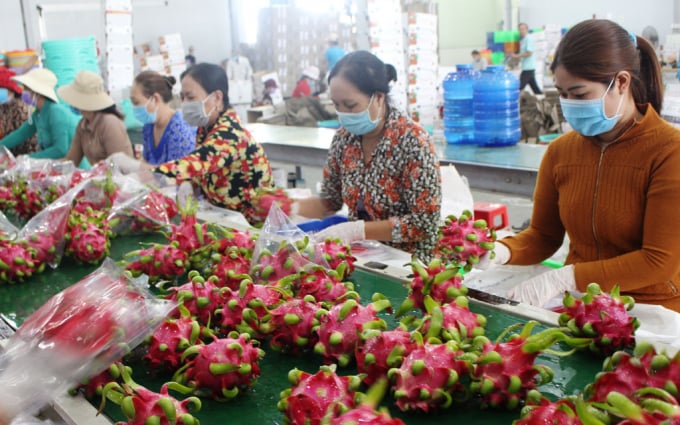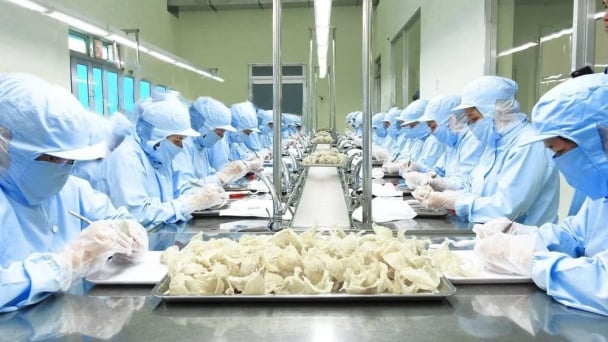May 17, 2025 | 07:45 GMT +7
May 17, 2025 | 07:45 GMT +7
Hotline: 0913.378.918
May 17, 2025 | 07:45 GMT +7
Hotline: 0913.378.918

India is a potential market for Vietnamese dragon fruit.
With a population approximately equal to China, about 1.4 billion people, India is a large market with plenty of room for agricultural products. According to the Vietnamese Embassy in India, this South Asian country can consume 48 million tons of fruit per year, with a total import value of about US$ 3.3 billion.
Vietnam started to export dragon fruit to the Indian market in 2014, with a steady growth rate. From US$ 1 million in the first year, Vietnam exported US$ 10 million of dragon fruit in 2019. Dragon fruit export turnover increased by 200% a year at the highlight development period.
Due to the Covid-19 epidemic, dragon fruit exports to India declined in 2020 and 2021. However, this South Asian market is still considered "fertile" with dragon fruit, especially in Vietnam - India has just celebrated the 50th anniversary of establishing diplomatic relations.
Speaking at the Conference on Export Promotion of Vietnamese dragon fruit to the Indian market on January 19, Mr. Do Thanh Hai, Counselor of the Embassy of Vietnam in India, said that many reasons motivate domestic businesses to change their approach to the Indian market.
First, it is a rising power with great growth potential. Second, India's growth rate is around 8-9% and will likely maintain a hot growth rate for another decade.
Third, India's GDP per capita is lower than that of Vietnam - a factor leading to the country's less stringent technical barriers.
"Demand for Indian consumer products will increase rapidly. Therefore, Vietnam needs to have a policy of anticipating long-term and sustainable development of dragon fruit in the immediate future. We fully believe that Dragon fruit export turnover to India can reach US$ 50 million per year", Mr. Hai said.
Promoting the export of dragon fruit in particular and agricultural products in general to India is also in line with the current trend of multilateralism and globalization in the world.

Mr. Do Thanh Hai, Counselor of the Embassy of Vietnam in India, said that many reasons motivate domestic businesses to change their approach to the Indian market.
However, Mr. Hai said that Vietnam does not have a clear and methodical strategy towards the Indian market. It comes from many reasons, including restructuring the production industry, raw material areas, logistics development, technical infrastructure, and transportation.
At the Conference, Mr. Hai discussed the issue of maintaining a particular supply for a market, including India. This is the essential factor he considers to establish the "Vietnamese dragon fruit" brand and the expectation of selling products at high prices.
Recently, the Vietnamese Embassy in India has worked with many retail systems. But to solve the problem fundamentally and methodically, Mr. Hai proposed the Ministry of Agriculture and Rural Development regulate and specific zoning for each market when planning dragon fruit growing areas. At the same time, he suggested that the Ministry of Industry and Trade soon establish an association in charge of promoting and exporting dragon fruits to India, instead of considering this as a temporary solution.
Mr. Bien Tan Tai, Deputy Director of Binh Thuan Department of Industry and Trade, admitted that the province's dragon fruit exports are mainly small-scale, accounting for about 80%, mainly to China.
To support the consumption of Vietnamese dragon fruit in India in both the short and long term, contributing to solving difficulties for the output of this fruit, and limiting dependence on the Chinese market, Mr. Nguyen Quoc Duan, General Director of Song Nam International Trade Development Co., Ltd. noted that domestic enterprises are especially interested in choosing partners.
"Working with Indian traders is not too difficult, but we have to choose a strong partner both in terms of brand and distribution channel," said Mr. Duan.

Mr. Bien Tan Tai, Deputy Director of Binh Thuan Department of Industry and Trade, spoke at the Conference.
According to Mr. Duan, the main reason for this is because the shipping time of dragon fruit by sea to India is about 3-4 weeks, while the storage time is not more than six weeks. Without clear information and a reasonable distribution plan, the partner enterprise cannot consume all dragon fruit in a week.
The second note Mr. Duan made at the Conference was about issues related to payment progress. According to the custom of exporting to China, domestic enterprises often send goods first and receive money later, and at the same time accept to customers to apply payment conditions. This mechanism poses many risks.
The director of Song Nam Company gave an example of a time when the Covid-19 epidemic was complicated, or the market collapsed, causing cargo ships to be 2-3 weeks late. Indian customers could leave the container at that time, causing Vietnamese businesses to lose everything.
According to Mr. Duan, the solution is to agree to a deposit of 50% of the goods. Even if non-traditional challenges like Covid-19, domestic businesses can ask Indian customers to pay 100% of the goods.
"Retaining customers is important, but retaining the market is more strategic," he emphasized.
Finally, Mr. Duan expressed the number of people who know English in India is not more than 50%. Therefore, domestic enterprises need to coordinate with the Embassy or longtime import-export enterprises in the South Asian country to have a reasonable approach strategy to avoid using Chinese-printed packaging to export to India.
"Dragon fruit is almost the cheapest fruit in India, and it is tax-free, so people love it. Besides dragon fruit, Vietnam needs to study and expand the market for other strong fruits such as longan, rambutan, coconut..." Mr. Duan said.
Mr. Tran Quoc Toan, Deputy Director of the Import-Export Department, Ministry of Industry and Trade, said India accounted for more than 13% of dragon fruit export turnover. Leaders of the import-export industry note that dragon fruit farms need to produce according to market signals or orders. In addition, the locality needs to ensure the standards and regulations of each exporting country.
Translated by Ha Phuc

(VAN) Japan's efforts to lower the price of rice through the release of its stockpile may finally be making some progress, albeit at a snail's pace.

(VAN) U.S. tariffs are not only a 'shock', but also an opportunity for Vietnamese businesses to renew their mindset toward comprehensive development.

(VAN) As Bac Giang lychee enters the harvest season, Minister Do Duc Duy expects that the fruit will contribute greatly to agricultural exports due to standardized production and deep processing.

(VAN) Consumers have shown a preference for free-range eggs, but those farming systems are more vulnerable to biosecurity risks like bird flu.
/2025/05/09/5701-1-184335_301.jpg)
(VAN) Vietnam’s eel exports nearly doubled thanks to a mud-free farming model, opening up new prospects while still facing numerous barriers related to international standards.

(VAN) Minister Do Duc Duy warned that if production is not professionalized and supply chains are not transparent, the U.S. market could become a growth bottleneck.

(VAN) Delegating surveillance responsibilities to local authorities is a cost-saving and efficiency-boosting measure that removes a key bottleneck for enterprises, according to Director General Duong Tat Thang.